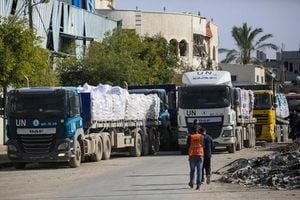Alberto Franceschini, a prominent figure in Italy's tumultuous history of political violence, passed away on April 11, 2025, at the age of 78. The news of his death was only made public on April 26, prompting reflection on his controversial legacy as a founder of the Red Brigades, a far-left terrorist organization that emerged in the late 1960s.
Born in Reggio Emilia in 1947, Franceschini was deeply influenced by his family's anti-fascist roots; his father, Carlo, was a notable anti-fascist who was arrested during Mussolini's regime. This background instilled in him a strong sense of political conviction from a young age. He joined the Communist Youth Federation and later the Italian Communist Party (PCI), but his views diverged from those of the party, particularly regarding the handling of public order during protests. This divergence culminated in his departure from the PCI in 1969, after a protest in Rimini against NATO.
Franceschini's radicalization led him to co-found the Red Brigades in 1970 alongside Renato Curcio and Margherita Cagol. The organization aimed to overthrow the Italian state through armed struggle, drawing inspiration from revolutionary movements worldwide. Initially, the group engaged in acts of sabotage and violence against corporate leaders, escalating to kidnappings and murders.
One of Franceschini's most notorious actions was his involvement in the kidnapping of Judge Mario Sossi in 1974. This event marked the Red Brigades' emergence onto the national political scene, showcasing their willingness to target high-profile figures. Franceschini was arrested later that year in a police operation led by General Carlo Alberto dalla Chiesa, which also resulted in the capture of Curcio. The arrest was facilitated by an infiltrator known as "Frate Mitra." Franceschini was subsequently sentenced to 60 years in prison for his crimes, including the murder of two members of the Italian Social Movement (MSI) in Padua.
Despite being incarcerated during the infamous kidnapping and murder of former Prime Minister Aldo Moro in 1978, Franceschini remained a vocal supporter of the Red Brigades' cause, even as he grappled with the implications of their violent tactics. He spent years in maximum-security prisons, where he continued to reflect on his choices and the direction of the organization.
By the mid-1980s, Franceschini began to distance himself from the armed struggle. He publicly dissociated from the Red Brigades, acknowledging the group's failures and the futility of their violent methods. In 1992, after serving 18 years, he was released from prison due to sentence reductions and began a new chapter in his life.
Following his release, Franceschini took on a role at Arci, a social cooperative in Rome, where he worked with immigrants, at-risk youth, and drug addicts. His shift from a life of violence to one focused on social rehabilitation marked a significant transformation, though he never fully renounced his past. He authored a memoir titled "Mara, Renato e io," co-written with journalist Pier Vittorio Buffa, which detailed his experiences and offered insights into the origins and evolution of the Red Brigades.
Franceschini's later years were characterized by a complex relationship with his past. He became known for questioning the narratives surrounding the Red Brigades and the Moro case, suggesting that the organization had been manipulated by external powers. He often remarked, "The dynamics are not those told by Moretti and Morucci; there has never been true clarity," indicating his belief in a deeper conspiracy at play.
His death has reignited discussions about the legacy of the Red Brigades and the broader implications of political violence in Italy. As a founder, Franceschini played a pivotal role in shaping the group's early ideology and actions, yet his eventual dissociation reflects the profound moral and ethical dilemmas faced by those involved in such movements.
Franceschini's life story encapsulates the turbulent history of Italy during the 20th century, marked by ideological battles, social upheaval, and the quest for revolutionary change. His journey from a young militant to a reflective advocate for social justice highlights the complexities of human conviction and the potential for redemption.
In the wake of his passing, many are left to ponder the lessons learned from Franceschini's life and the enduring impact of the Red Brigades on Italian society. His story serves as a reminder of the fine line between activism and extremism, and the consequences that can arise when political beliefs manifest in violence.





